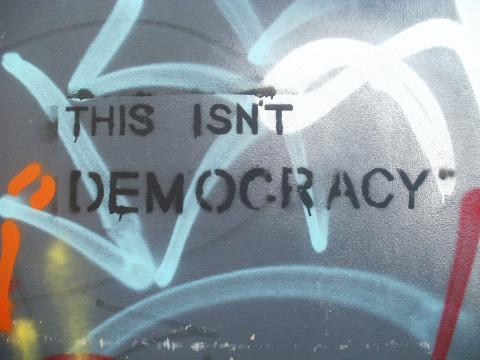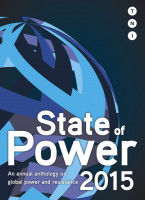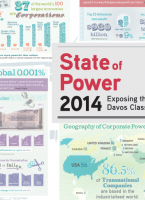State of Power 2016: Call for Papers
Temas
The Transnational Institute (TNI) in the Netherlands is issuing an open call for essays/short papers for its forthcoming State of Power report launched in late January 2016 to coincide with the World Economic Forum in Davos. In 2016, we are particularly looking for accessible, engaging essays that interrogate how power relates to democracy.

https://www.flickr.com/photos/emmettgrrrl/
TNI’s annual State of Power reports have, since their launch in 2012, become a must-see reference point for citizens, activists and academics concerned with understanding the nature of power in our globalised world. With a mixture of insightful essays and compelling infographics, State of Power has examined the changing nature of power (economic, political, cultural, social), exposed the key players who control power, and highlighted counter-power movementsseeking to transform our world.
For the second year running TNI is opening up the call to the public, particularly academics engaged in and supportive of social movements and activists keen to step back and reflect on their struggles, in order to pull in the best analysis on power.
Power and Democracy
For a long time, the powerful in our world were happy to preach the messages of ‘democracy’ as it seemed to coincide with their interests particularly in a Cold War context. Advocating democracy and deregulation of markets were seen as synonymous, even though elites were careful never to embrace the application of democracy to issues of economic control.
In more recent years, though, democracy seems to be ever more an irritant for elites and something they are happy to ignore– in Europe at least reflected most powerfully this year in the complete dismissal of the Greek elections and referendum by the Eurozone group. As the President of the European Commission, Jean-Claude Juncker, put it bluntly, “There can be no democratic choice against the European treaties”. Even if Greece had gone its own way and left the Euro straitjacket, it is doubtful the international financial markets would have given the Greek any more democratic room to manoeuvre.
Meanwhile at a global level, one can see similar trends in governance as bodies like the World Economic Forum push for self-selected multi-stakeholder forums to decide on critical issues, arguing that democracy and states no longer deliver effective solutions and embracing corporations as the new global citizens of our age. Throughout the world, movements struggle continuously against government elites that constrict democratic choices and repress autonomous civil society movements. This is true too of progressive governments that rose to power on the back of social movement struggles and yet now face growing criticism for limiting democratic debate and undermining critical social movements.
These experiences prompt a number of important questions that we would like to interrogate:
- Where worldwide is entrenched economic power currently threatening democracy and how?|
- What are the forces and dynamics that are leading to this collision of power versus democracy? What shape is this likely to take in the future?
- How has the rise of corporations and financial markets impacted on democracy?
- Where else is democracy being challenged worldwide?
- What within the institutions of states impedes democracy and what enables it to flourish?
- What room does democracy or popular will have in our current global order? Where are the key battlefronts? Are there weaknesses/openings for democracy that need our support? How best can we challenge this clampdown on popular will?
- How has power shaped democracy in fields of culture and society?
- How can we expand democracy in order to regain power – for example over the institutions of the state or over the economic sphere? What would that look like?
- Is democracy still relevant as a slogan and banner for movements involved in fighting for social and environmental justice? Do we need new concepts to enrich and motivate our struggles?
TNI is also open to other reflections on the issue of power and democracy that may be of use to social movements involved in fighting for social and environmental justice. Although many of these questions are theoretical in nature, the most useful analysis will use concrete examples and case studies to illustrate their points.
TNI is particularly interested in essays that relate to areas we most closely work on such as corporate impunity, trade and investment policies, land and agrarian issues, resource grabbing, public services, security and civil liberties, social movements and counter-power (see https://www.tni.org/en/projects) However we are ultimately interested in the best analysis (whatever the topic) if it approaches power from the critical perspective held by movements engaged in the struggle for social and environmental justice and political transformation.
To encourage submissions from activists on low-incomes and people from the Global South , we are also offering a few grants of 600 euros for selected essays from individuals that fit this category. Please indicate in your submissions whether you would like to apply for this grant, providing some evidence that you do not have a sufficiently salaried position that would support you writing the essay. The full amount will only be distributed if your essay is shortlisted for the main report, although a smaller discretionary amount will be made to those who applied for the grant whose essays make the long list. Abstracts will receive no remuneration. Final decisions on grants remain with the Editorial Panel.
For an idea of the kind of essays we are interested in, please read the essays featured in State of Power 2014: http://www.tni.org/briefing/state-power-2014 and 2015 https://www.tni.org/en/stateofpower2015
Style
TNI is not an academic institution, and seeks to provide analysis that can be read and used by a broad range of activists and social movements. We are therefore looking for new and insighful analysis that is not over-theoretical and written in a style that is accessible. We are interested in new and insightful analysis and the evidence and arguments must be rigorous. We encourage the use of stories, concrete examples, metaphors or journalistic techniques. We discourage the overuse of academic jargon and reviews of academic literature that mean little to the public. In our experience the more accessible the material, the more widely it is used and shared.
Process
The final report will be made up of a mixture of essays from this open call and a few pre-commissioned essays. We have designed a process to feature what we consider the best essays in the main report. The decision on which papers are featured will be decided by an Editorial Panel made up of the editor of the report, the Director and the Communications Manager of TNI.
The selection process will be as follows:
1. In the first stage, researchers will be asked to provide abstracts, a short bio and some links to previous work. Abstracts can be based on existing papers or be provisional ideas of what you hope to explore. If you would like to apply for the grant – available to participants – please indicate this at this stage.
2. Those whose abstracts are chosen will be asked to submit an essay. The top four or five essays will be selected for the report by the Editorial Panel.
3. Authors of selected essays will be required to go through two or possibly three rounds of revisions based on feedback by the Editorial Panel and edits by the Copyeditor.
4. A small number of essays that do not make the shorlist for the report – but are nevertheless considered good essays by the Editorial Panel - will be available as downloadable PDFs linked from the main report.
Instructions for submission
Abstracts must be emailed to stateofpower AT tni.org by 9 October 2015. Those asked to provide essays will be notified on the 15 October. Final essays will be due on 20 November 2015.
FOR ABSTRACTS
- Abstracts/essays must address the issue of power and democracy from a critical perspective, seeking to provide useful knowledge and analysis for movements engaged in the struggle for social and environmental justice
- Abstracts/essays can be based on reworked versions of existing or previously published essays/papers but must be made accessible to a non-academic audience
- TNI particularly welcomes submissions by young scholars, people based in the Global South and women. Due to resource constraints though, at this point, we can only accept essays in English
- Abstracts must be a maximum of 1000 words. They do not need to be of continuous prose but must capture the main arguments of the essay and can be expanded outlines. Bios should be 200 words.
FOR ESSAYS
- Essay length: 5000 words. Shorter essays are acceptable, but not longer than 5000 words.
- Style: TNI has five basic criteria for its research and publications that will also be used to assess the abstracts and essays:
- Credible: Well researched and evidence-based
- Accessible: Readable by a broad non-specialist audience (in other words please avoid too much academic jargon) and try to use stories, examples
- Original: Adds depth, new insights or detail to existing knowledge/research
- Radical: Tackles the structural roots of critical issues
- Propositional: Does not just critique, but also where relevant puts forward just alternatives
- Please include an abstract at the top of the paper (maximum 500 words) and add a short bio (200 words)
- Do not include references in brackets within the text. Instead provide a bibliography at end of essay and/or provide endnotes for references in Chicago style. Please do not overdo it on the endnotes (no more than 30 for each essay). Use them mainly for referring to facts/evidence that may be surprising, questioned or challenged.
- Please send as .doc file or .docx file
- The decision of the Editorial Panel is final. If your abstract or essay is chosen for the book, please be ready to respond to peer reviews and copyediting comments based on the timeline below.
Timeline
August Call for abstracts/papers
9 October Deadline for submission of abstracts
15 October Notification of chosen abstracts for final essays
20 November Submission of essays
26 November Notification of chosen essays
December Revisions and liaising with Editor
9 January Copyedits sent to author for final check/revision
19 January Launch


